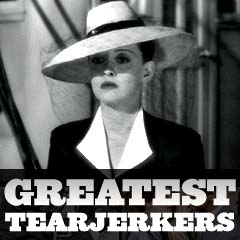|
The Greatest Tearjerkers of All-Time
|
|
Title Screen
|
Movie Title/Year and Brief Tearjerker Scene Description
|
Screenshots
|
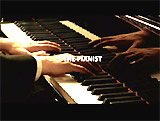
|
The Pianist (2002)
 #59 #59
- the disturbing imagery of a ragged, bearded Polish-Jew
named Wladyslaw Szpilman (Adrien Brody), half-limping and wandering
through the war-torn, bombed-out streets of German-occupied Warsaw,
and entering abandoned buildings in a desperate search for food
- the upsetting scene in which classical
pianist Szpilman, a Polish-Jew in hiding, was caught
as he was clumsily opening a large tin can of vegetables; the
camera panned upward from a pair of shoes to reveal Wehrmacht Captain
Wilm Hosenfeld (Thomas Kretschmann) in front of him; under threat
of death, Szpilman was asked questions: ("What
are you doing here? Who are you?...What are you doing?...Do you
live here? Do you work here?...What do you do for a living?")
- when Szpilman identified himself as a pianist, he
was forced to play a piece on his intact piano ("Come. Play
something")
- Chopin Ballade No. 1 in G Minor; afterwards, the officer asked: "Are
you hiding here? Jew? Where are you hiding?" Wladyslaw
replied: "In the attic"; afterwards, Hosenfeld brought
Szpilman food to help him survive: (Szpilman: "I don't know
how to thank you." Hosenfeld: "Thank God, not me. He
wants us to survive. Well, that's what we have to believe")
- the rescue scene when Szpilman was found by Polish
troops liberating Warsaw, but ironically was almost shot because
he was wearing Hosenfeld's German Army coat in order to keep warm:
("No! Don't shoot, I'm Polish! I'm Polish!...Please! I beg
of you! Don't shoot, don't shoot. Don't shoot. I beg you, I'm a
Polish");
the troops asked: "Why the f--king coat?" - and he simply
replied:
"I'm cold"
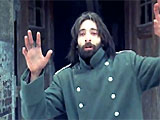
Szpilman's Rescue - Almost Shot
|
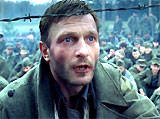
Hosenfeld Imprisoned - And Begging For Help
|
- after the liberation, the scene of freed Jews decrying
their German captors, now imprisoned in an enclosed barb-wired
yard: ("German
f--kers! Murderers! Murderers! Dirty bastards! Assassins! Bastards!"),
and Hosenfeld's desperate entreaty to one of the Jews (who revealed
he was a violinist) to seek assistance from a musical acquaintance
named Szpilman ("I helped him to hide himself. Tell him I'm
here. Ask him to help me")
|
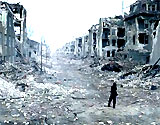
Polish-Jew Szpilman in War-Torn Warsaw

Encounter with German Captain Hosenfeld
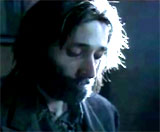
Playing the Piano For the Officer
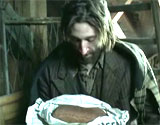
Brought Food to Survive
|

|
Pickup on South Street (1953)
- the scene in which embittered,
world-weary tie-seller and "stoolie" informant street peddler Moe
Williams (Thelma Ritter) told her killer Joey (Richard Kiley) in
her dingy rooming house: ("So
I don't get to have the fancy funeral after all. Anyway, I tried.
Look, Mister, I'm so tired you'd be doin' me a big favor if you'd
blow my head off")
- the camera panned to the left and a gunshot was heard - with the
final image of her bedside Victrola's needle reaching the end of
the record (the popular French tune "Mam'zelle")
- the
subsequent scene in which pickpocket Skip McCoy (Richard Widmark)
reclaimed Moe's body from a tugboat (taking her in coffin # 11 to
potter's field) in order to give her a proper burial ("I'm gonna
bury her")
- fulfilling her sole wish in life
|
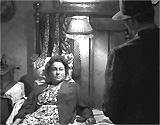
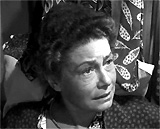
Moe to Killer: "You'd be doin' me a big favor if you'd blow my head off"
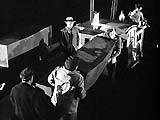
Skip's Determination to Bury Moe
|
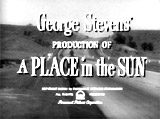
|
A Place
in the Sun (1951)
- the final prison farewell
scene of condemned
and doomed poor boy George Eastman (Montgomery Clift) in his death
cell before his execution with his rich society girlfriend
Angela (Elizabeth Taylor): (Angela: "...I'll
go on loving you for as long as I live." George: "Love
me for the time I have left. Then, forget me." (They kissed
one last time.) Angela: "Goodbye,
George."
(She half-turned away and then looked back.) "Seems like we
always spend the best part of our time just saying goodbye")
- George took to his death the superimposed image
of dark-haired Angela kissing him
|
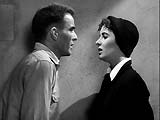
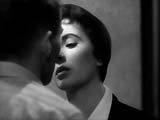
Goodbye Kiss Before George's Execution
|
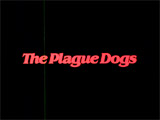
|
The Plague Dogs (1982)
- the opening scene of the near-drowning
of black mongrel labrador Rowf (voice of Christopher Benjamin)
to see how long he could dog-paddle before he gave up, by animal
research experimenters in a British lab in Coniston

Near Drowning of Rowf
|

Experimental Drowning Test on Rowf
|
- the continuing, upsetting experimentation and terrible
mistreatment of lab animals (chimps, rabbits, rats, etc.), including
the brain-tests on black and white fox-terrier Snitter (voice of
John Hurt) who had dreams/memories of his days as a house pet,
sitting with his owner Alan Wood in a living room near a warm fire;
Snitter's kind human owner was seriously injured in a cross-walk
while trying to protect Snitter from being hit by a truck
- the heart-rending scene
of a dead puppy being scraped out of its cell
- the shocking scene of a friendly hunter finding
Snitter on the loose, but when Snitter jumped up, he accidentally
triggered the hunter's gun to shoot - and the man was hit in the
face with the blast and killed
- the ending in
which the two dogs (who were suspected of being tested in the lab
with bubonic plague) were heavily pursued by the government and
other forces; they swam out to sea - choosing to be free rather
than captured: (Snitter:
"I can't swim anymore, Rowf...", Rowf: "We must...
be near the island...There is. There. Can't you see it? Our island...")
- the film cut to the credits as they disappeared into the fog
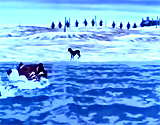
|
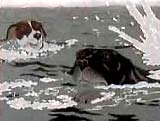
|
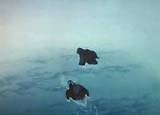
|
|
Escape of Two 'Plague' Dogs
|
|


Lab Experiments on Chimps and Rabbits

Snitter Remembering Days as House Pet with Owner
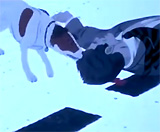
Serious Injury of Snitter's Human Owner Alan Wood


Hunter Blasted in the Face
|

|
Platoon (1986)
- the startling scene in which the saintly and compassionate
Sgt. Elias (Willem Dafoe) staggered out of the jungle after being
shot by sociopathic, malevolent and murderous Sgt. Barnes (Tom Berenger)
and left for dead in the Vietnamese jungle - his arms outstretched
upwards in slow-motion in a sacrificial, crucifixion pose (while
Samuel Barber's Adagio For Strings played) as he was repeatedly
shot by VC enemy forces - viewed from a chopper overhead

|
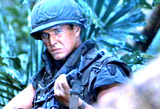
|
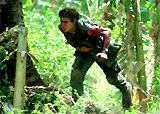
|
|
Sgt. Barnes Shooting Elias
|
Wounded Elias Running Into View
|

|
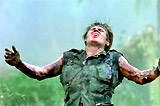
|

|
|
Sgt. Elias' Crucifix Death Pose
|
- in the conclusion, wounded idealistic rookie soldier,
Private Chris Taylor (Charlie Sheen), gave his final overwhelming
thoughts after being carried on a stretcher for evacuation by a
helicopter as he saw the devastation below and craters full of
corpses - ("I
think now, looking back, we did not fight the enemy. We fought
ourselves, and the enemy was in us. The war is over for
me now, but it will always be there for the rest of my days...")
|
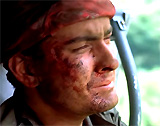
Wounded Chris' Final Thoughts
|

|
Powder (1995)
- the opening scene of the death of pregnant mother
Anna, who was struck by lightning, although her son survived but
was born prematurely; the doctor announced to Greg (Phil Hayes):
("Anna
didn't make it, Greg. We tried everything. The trauma was just
too much...The baby, I'm concerned, might have some abnormalities.
Outwardly, we can already tell that the child has no pigmentation.
It's called albinism. It's strictly genetic....Greg, you have to
remember that an unborn child experiences everything that the mother
experiences")
- and the father Greg's reaction of disowning his
child after first looking at it: "That's not my son. That's
not my son"
- the scenes of cruelty aimed at a mystical outcast
- a lonely, bald albino teenager Jeremy "Powder" Reed
(Sean Patrick Flanery) by his peers, including bully John Box (Bradford
Tatum) who labeled him a homosexual; when John's heart stopped beating
due to a strong electromagnetic impulse emanating from Jeremy's body,
John was miraculously revived by "Powder's" touch to his bare chest
- the climactic yet bizarre
ending in which Powder bid farewell to his three sole friends who
wanted him to find peace and happiness elsewhere: social worker/special
educator Jessie Caldwell (Mary Steenburgen), compassionate Sheriff
Doug Barnum (Lance Henriksen) and high-school science teacher Donald
Ripley (Jeff Goldblum), who told him while referencing Albert Einstein:
("'It's become
appalingly clear that our technology has surpassed our humanity.'
Alfred Einstein. I look at you and I, I think that someday our
humanity might actually surpass our technology")
- and then, under a threatening and dark cloudy sky,
Powder (with his shirt open and arms outstretched) ran into an
open field where he was pursued by everyone. After a lightning
flash struck him, a brilliant and colorful ring of light exploded
or emanated from him and he dissipated into the sky as pure energy.
His friends were stunned but ecstatic about his electromagnetic
transformation
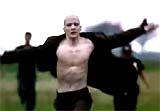
|
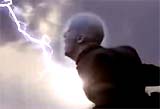
|
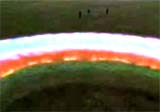
|
|
Powder
Struck by Lightning Flash
|
|

News of Anna's Death During Birth Given to Greg (Phil
Hayes)
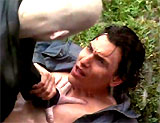
Powder's Miraculous Healing of a Bully


Powder's Farewell to His Three Friends
|

|
Pretty Woman (1990)
- the ultimate rescue of street
prostitute Vivian Ward (Julia Roberts) by her Prince Charming -
corporate raider Edward Lewis (Richard Gere) - in the film's Cinderella-like
fantasy-conclusion; in her hotel apartment, she turned as she heard
a horn honking (and opera music blaring) as Edward arrived in
a white chauffeured limousine (standing in the sun-roof) and
greeted her with a bouquet of red roses and a closed black umbrella.
She climbed out onto her fire-escape balcony, where they shared a
conversation:
Edward: "Vivian, Princess Vivian! Come down! It had to be the top floor,
right?"
Vivian: "It's the best."
Edward: "All right. I'm coming up. (When he reached her level.) So,
what happened after he climbed up the tower and rescued her?"
Vivian: "She rescues him right back." (They kissed)
|
"Princess" Vivian's Rescue by Her White
Knight on Fire Escape
|
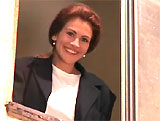
|
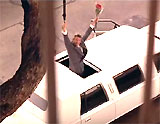
|
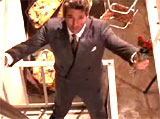
|
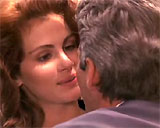
|
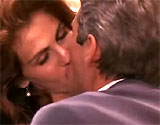
|
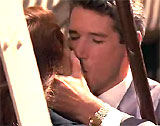
|
- in the film's ending, the camera pulling back,
overhearing the words of a Happy Man (Abdul Salaam El Razzac) crossing
the street, to the tune of Roy Orbison's title song "Pretty Woman":
("Welcome
to Hollywood! What's your dream? Everybody comes here. This is Hollywood!
The land of dreams. Some dreams come true, some don't. But keep on
dreamin'. This is Hollywood! Always time to dream, so keep on dreamin'")
|

|
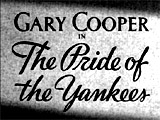
|
The Pride of the Yankees (1942)
- the emotional turmoil New York
Yankees star first baseman Lou Gehrig (Gary Cooper) suffered after learning in his mid-30s that
he was afflicted with the uncurable disease of amyotrophic lateral sclerosis
(ALS)
- Gehrig's famous farewell
speech in his # 4 uniform on July 4, 1939 in front of a packed Yankee
Stadium of 62,000 fans, before which he was joined by his tearful
wife Eleanor (Teresa Wright) in the dark tunnel leading to the infield,
where he was honored and then spoke: ("...People
all say that I've had a bad break. But today -- today I consider myself the
luckiest man on the face of the earth")
|
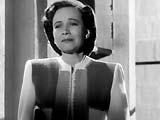
Gehrig's Tearful Wife Eleanor (Teresa Wright)
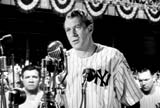
Gehrig's Farewell Speech to Stadium Full of Fans
|
